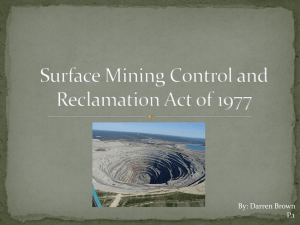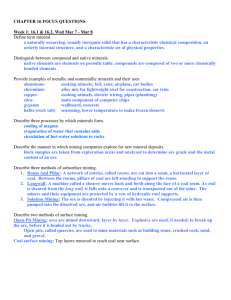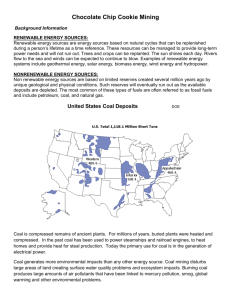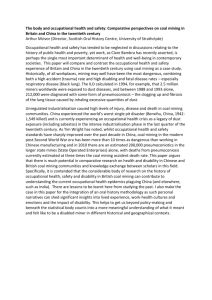Coal Lesson - Inside Mines
advertisement
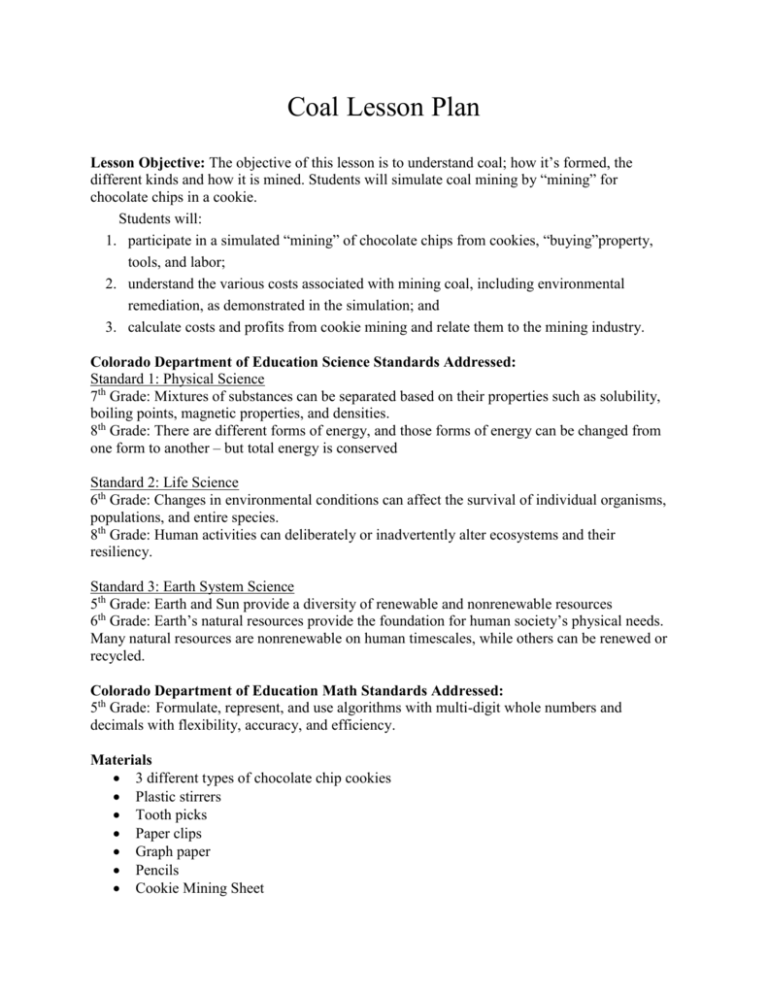
Coal Lesson Plan Lesson Objective: The objective of this lesson is to understand coal; how it’s formed, the different kinds and how it is mined. Students will simulate coal mining by “mining” for chocolate chips in a cookie. Students will: 1. participate in a simulated “mining” of chocolate chips from cookies, “buying”property, tools, and labor; 2. understand the various costs associated with mining coal, including environmental remediation, as demonstrated in the simulation; and 3. calculate costs and profits from cookie mining and relate them to the mining industry. Colorado Department of Education Science Standards Addressed: Standard 1: Physical Science 7th Grade: Mixtures of substances can be separated based on their properties such as solubility, boiling points, magnetic properties, and densities. 8th Grade: There are different forms of energy, and those forms of energy can be changed from one form to another – but total energy is conserved Standard 2: Life Science 6th Grade: Changes in environmental conditions can affect the survival of individual organisms, populations, and entire species. 8th Grade: Human activities can deliberately or inadvertently alter ecosystems and their resiliency. Standard 3: Earth System Science 5th Grade: Earth and Sun provide a diversity of renewable and nonrenewable resources 6th Grade: Earth’s natural resources provide the foundation for human society’s physical needs. Many natural resources are nonrenewable on human timescales, while others can be renewed or recycled. Colorado Department of Education Math Standards Addressed: 5th Grade: Formulate, represent, and use algorithms with multi-digit whole numbers and decimals with flexibility, accuracy, and efficiency. Materials 3 different types of chocolate chip cookies Plastic stirrers Tooth picks Paper clips Graph paper Pencils Cookie Mining Sheet Background Coal is formed by swamp plants that died millions of years ago and were buried by layers of dirt and water. Eventually, heat and pressure turn the remains into coal. Peat is not true coal, but partially decayed plant remains found in swamp land and can be used for heating. There are various degrees of coal: lignite, sub-bituminous, bituminous and anthracite (the carbon content increasing). Coal is not found everywhere and has to be mined out of the ground. There are two types of coal mining, shaft mining and mountaintop removal. Shaft mining is dangerous for the miners because potential for cave ins and leaking poisonous gases. Mountaintop removal removes large chunks of mountain to get to the coal seams underneath. While safer for the miner, mountaintop removal has devastating effect on the environment. Beginning with the Surface Mining Control and Reclamation Act in 1977, mining companies were required to restore mined land to natural or usable state. Lecture: Ask students what coal is? Explain to them how it is formed and the different type of coal. Pass around examples of coal. Discuss with students that coal is not found everywhere and must be mined out of the ground and that there are two types of coal mining: shaft mining and mountaintop removal. Discuss with students that mining companies must be restore the land after they mine it, called reclamation. Activity: 1) Tell students that they will have a starting budget of $20 to start their own coal mining company. First they must decide which property they want on the cookie mining worksheet (A) (assign each bag of cookies a different property). Hand out cookie of choice and graph paper to the student. Students are to then draw a circle of their cookie on the graph paper. Explain to students that they must reclaim their land and any crumbs that are not back in the circle will cost them. 2) Next student must decide which and how many piece of equipment they want to use (B). Hand out desired equipment. 3) For each piece of equipment, students have to figure out the labor cost (C) . 4) Have student begin to mine out chocolate chips (~10-15 minutes). 5) Once students are done mining, go around and count squares on the graph paper that have crumbs and put that number in (D). 6) Have students calculate their costs (E). 7) Have students calculate their profits by counting all of their mined chocolate chips (F). Cookie Mining Worksheet Costs A. Land Acquisition (Price of Cookie) (Montana-$3; Pennsylvania-$5; Kentucky-$7) Name of Property _________________________ B. Equipment Costs Flat toothpick __________ x$2 = ______________ Round toothpick ________x$4 = _______________ Paperclip ______________x$6 = _______________ Total equipment cost = ________________ C. Mining/Excavation Labor Costs (Chip Removal) # of total equipment ___________ x$1.25= __________ D. Reclamation Squares covered outside original outline after reclamation ________x $1 labor= ______ E. Total Costs (A. + B. + C. + D.) _____+_____+_____+_____=____________ Profit F. Number of whole chips mined __________ x$2.50=____________________ Calculation Net Profit/Loss Startup cost Costs (E.) $20 -___ Profits (F.) +___ Total Profit/Loss ___
